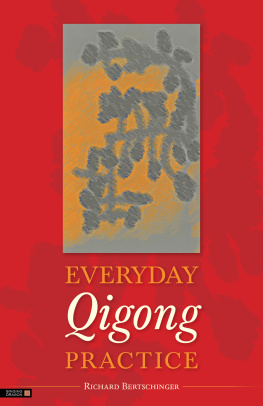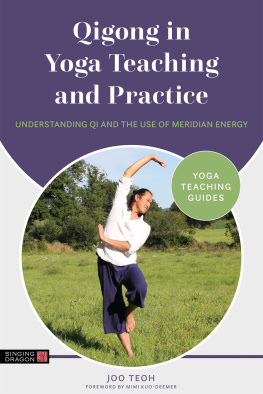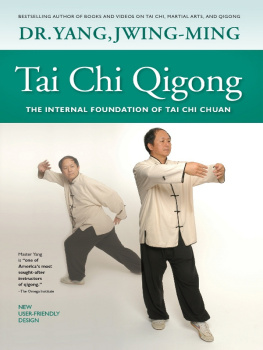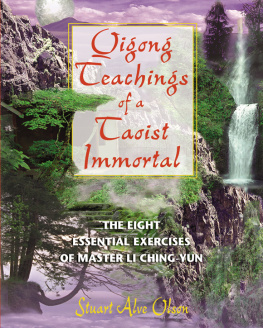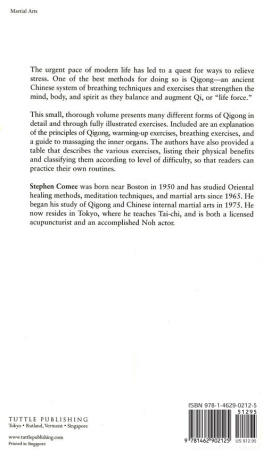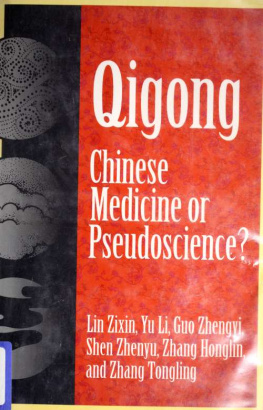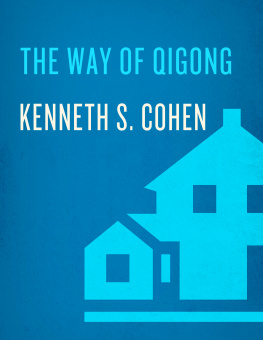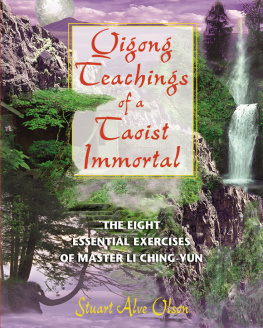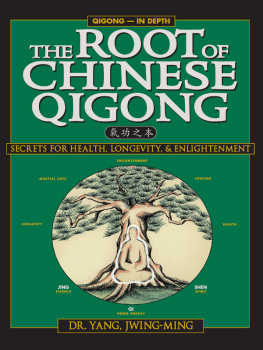Lewars - Everyday Qigong Practice
Here you can read online Lewars - Everyday Qigong Practice full text of the book (entire story) in english for free. Download pdf and epub, get meaning, cover and reviews about this ebook. year: 2012, publisher: Jessica Kingsley Publishers, genre: Religion. Description of the work, (preface) as well as reviews are available. Best literature library LitArk.com created for fans of good reading and offers a wide selection of genres:
Romance novel
Science fiction
Adventure
Detective
Science
History
Home and family
Prose
Art
Politics
Computer
Non-fiction
Religion
Business
Children
Humor
Choose a favorite category and find really read worthwhile books. Enjoy immersion in the world of imagination, feel the emotions of the characters or learn something new for yourself, make an fascinating discovery.
- Book:Everyday Qigong Practice
- Author:
- Publisher:Jessica Kingsley Publishers
- Genre:
- Year:2012
- Rating:4 / 5
- Favourites:Add to favourites
- Your mark:
- 80
- 1
- 2
- 3
- 4
- 5
Everyday Qigong Practice: summary, description and annotation
We offer to read an annotation, description, summary or preface (depends on what the author of the book "Everyday Qigong Practice" wrote himself). If you haven't found the necessary information about the book — write in the comments, we will try to find it.
Everyday Qigong Practice — read online for free the complete book (whole text) full work
Below is the text of the book, divided by pages. System saving the place of the last page read, allows you to conveniently read the book "Everyday Qigong Practice" online for free, without having to search again every time where you left off. Put a bookmark, and you can go to the page where you finished reading at any time.
Font size:
Interval:
Bookmark:
Appendix
Selections from Classical Texts
1. from the Tao-Te Ching (Way and its Power): the breath
The Spirit of the Valley will Never Die
It may be named the Dark Female.
The gateway to the Dark Female
Is the root to all Heaven and Earth.
Continuously one, as if always present,
In use, it will never fail.
Cultivation arises through a fertile valley. The spirit of the valley never dies because a valley is the proper place for life. Unlike us men, the women never live for themselves. The virtue of the Yin feminine, the dark female lies in her detachment, resilience, ordinary chores, common and continuous usage. This is also the role played by the breath. Nurture this spirit and you will never confront death. Her gateway can be seen as the opening formed by the mouth and nose. The root to all Heaven and Earth the channel for the breath present in all life, passed back and forth.
In practice our breathing should be continuously one , fine and long. Gentle, it is as if always present, yet hardly sensed at all. It makes for contentment, relaxation and an unforced manner.
2. from the Taoist rhyme
A Mirror to the Medicine
the energy before we think
the energy as we think,
as we manage to get into it
we always feel slightly tipsy!
the days have moments they join
the months have moments they join,
delve into the still solid earth
settle expansion, extraction, wood and metal
climb up the magpie bridge
clamber down the magpie bridge,
in heaven respond the stars
on earth respond the tides
their gentle breaths arise
the receptive fire turns around,
entering the calm Yellow Room
we fashion the most precious jewels!
This tract is at least a thousand years old. Find the time, position and place for your Qigong practice and the fengshui (windwater) will be present. This is the moment they join. Delve into the earth, there to read its stillness. Settle wood and metal, Yin and Yang, just the same. In Chinese legend the magpies form, one day a year, a bridge across the heavens so that the two lovers, the herdboy and spinning girl, can meet for the night. As their gentle breaths arise, the stars respond, and the tides beneath. Then the receptive fire of the body lights up the Yellow Room (yellow, the colour of the mean) and we enter, hand and hand together, the cave of jewels. Just remember always natural in touching, always.
3. from the Ming book (16th century)
Healing Without Medicines ,
by Dr Li Zhongzi
THE MEDICINE OF THE MIND
The wisest doctors of ancient times could heal mans heart and innermost being. This was because they took the opportunity to act before a disease had begun. But what about present-day physicians? They only know how to heal someone already sick; they do not know how to heal a persons heart. It is a case of neglecting the root to chase after the branches.
They do not enquire of the source of the trouble but boldly throw themselves into the stream of the disease. You may be looking for a speedy cure, but why do this!
They should recognize that disease originates in the heart, in our own innermost being. Calamities arise from our own actions. The fellow Buddha said:
It all lies in the constructs of the heart.
The best is in never making false charges!
It is for this reason that when strong emotions rise in the body, our true nature may be overturned in a twinkling. If this happens over a long time, eventually great sickness invades. And it is certainly not herbs or minerals which can cure this.
Doctors cannot enter the homes of criminals.
Herbs cannot act where there is no love.
In general, then, happiness acts the lord, while catastrophe plays the servant. Winkle out its mechanism and not one part will escape.
The cause of all this misery lies in the penalties of Heaven. It is the misery of self-destruct. The penalties of Heaven originate from a former life where we accumulated too many transgressions. But while it is heaven and earth who dispatch us into this misery, our calamities find a source in our own heart.
Therefore while worldly thoughts and worries injure the heart, grief injures the lungs, resentment injures the liver, food and drink injure the spleen, and licentious desires injure the kidneys, the healing power of herbs are only half of it. The rest lies wholly beyond the strength of herbs. It must lie in the medicine of the mind.
What is meant by the medicine of the mind? You might well listen to this poem I found in Mirroring the Forest Temple. It goes:
If your own mind is failing, your own mind will know it.
The instant a thought comes make it a thought of healing.
In general sickness is born and created in the mind.
If the mind is kept safe, how can sickness arise?
So it is essential to take control when casting out intrusion.
The ancient Book of Medicine has one phrase which instructs us all. It reads: Do not heal a disease which has already begun. Heal a disease which has not yet begun. Treating a disease is not as good as treating where there is none; curing the body is not as good as curing the mind. By this I mean that curing others is simply not as good as first curing yourself!
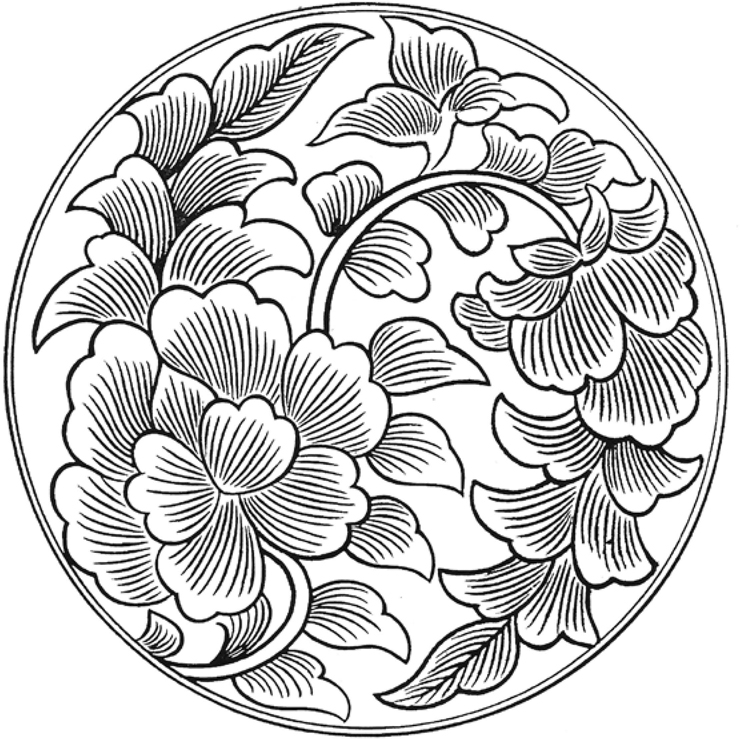
Disclaimer : No health claims are made in this book. If in doubt or in pain consult your physician. Unusual lumps or bumps should not be massaged go and get them checked
First published in 2013
by Singing Dragon
an imprint of Jessica Kingsley Publishers
116 Pentonville Road
London N1 9JB, UK
and
400 Market Street, Suite 400
Philadelphia, PA 19106, USA
www.singingdragon.com
Copyright Richard Bertschinger 2013
Illustrations copyright Harriet E. J. Lewars 2013
All rights reserved. No part of this publication may be reproduced in any material form (including photocopying or storing it in any medium by electronic means and whether or not transiently or incidentally to some other use of this publication) without the written permission of the copyright owner except in accordance with the provisions of the Copyright, Designs and Patents Act 1988 or under the terms of a licence issued by the Copyright Licensing Agency Ltd, Saffron House, 610 Kirby Street, London EC1N 8TS. Applications for the copyright owner's written permission to reproduce any part of this publication should be address to the publisher.
Warning: The doing of an unauthorized act in relation to a copyright work may result in both a civil claim for damages and criminal prosecution.
Library of Congress Cataloging in Publication Data
A CIP catalog record for this book is available from the Library of Congress
British Library Cataloguing in Publication Data
A CIP catalogue record for this book is available from the British Library
ISBN 978 1 84819 117 4
eISBN 978 0 85701 097 1
Printed and bound in Great Britain
This small book summarizes a few of the exercises I have taught over the past twenty-five years in my Qigong classes. Sources are traditional, and were adjusted to the class. I also need to acknowledge my instruction at Chengdu College of Chinese Medicine in 1986. My pupils have led the way, as ever. Indeed to all of them Im eternally grateful. My teacher Gia-fu Feng (d. 1985) used to say every blade of grass in its right place. To him also I owe an inestimable debt. On the wall of the bath chamber of Emperor Tang (founder of the Shang dynasty in 1766 BCE) was inscribed, in gold letters: as the sun makes it anew, day by day make it new, every day make it anew. This is the practice of Qigong.
This really is a great book. Richard Bertschinger achieves a brightness and levity in the pages of this volume that reflects his teaching a lightness of being that is both mischievous and benevolent, and authentically Taoist. In retaining the mythic poetry through which Taoists desc ribe human experience and the wider macrocosm (the purple dragon of the tongue, the heavenly column of the neck), Richard remains true to the transformative language of this treasured tradition that seeks, in his words, to make anew our experience each day.
Next pageFont size:
Interval:
Bookmark:
Similar books «Everyday Qigong Practice»
Look at similar books to Everyday Qigong Practice. We have selected literature similar in name and meaning in the hope of providing readers with more options to find new, interesting, not yet read works.
Discussion, reviews of the book Everyday Qigong Practice and just readers' own opinions. Leave your comments, write what you think about the work, its meaning or the main characters. Specify what exactly you liked and what you didn't like, and why you think so.

